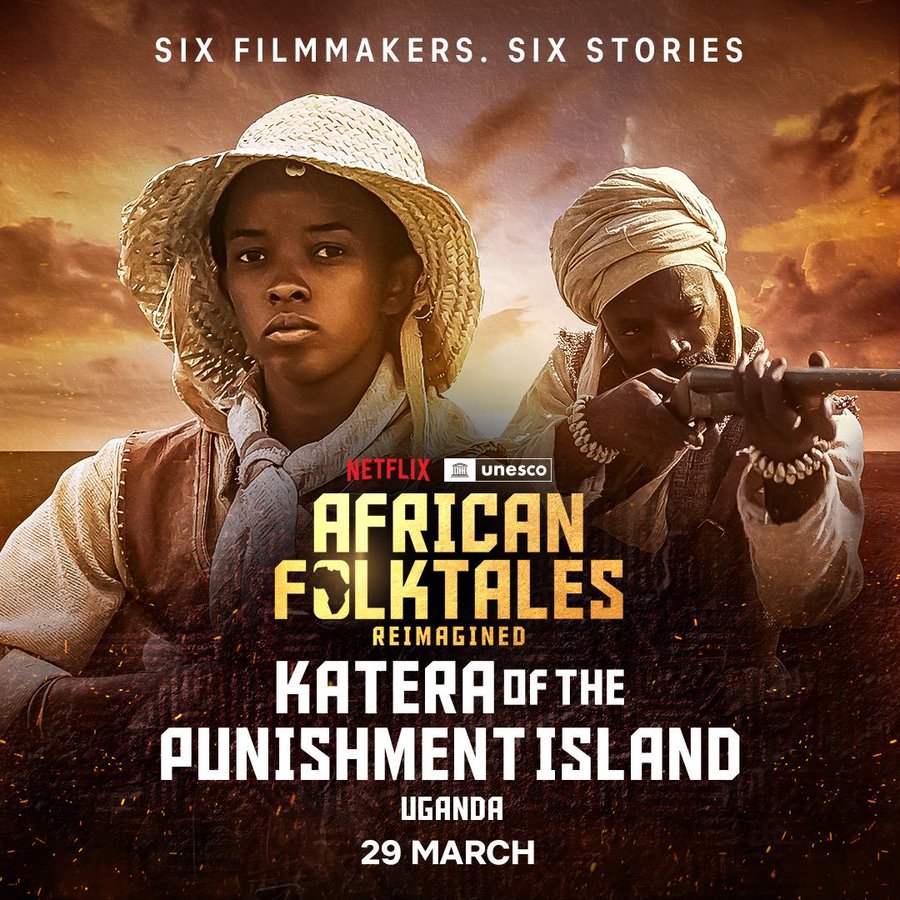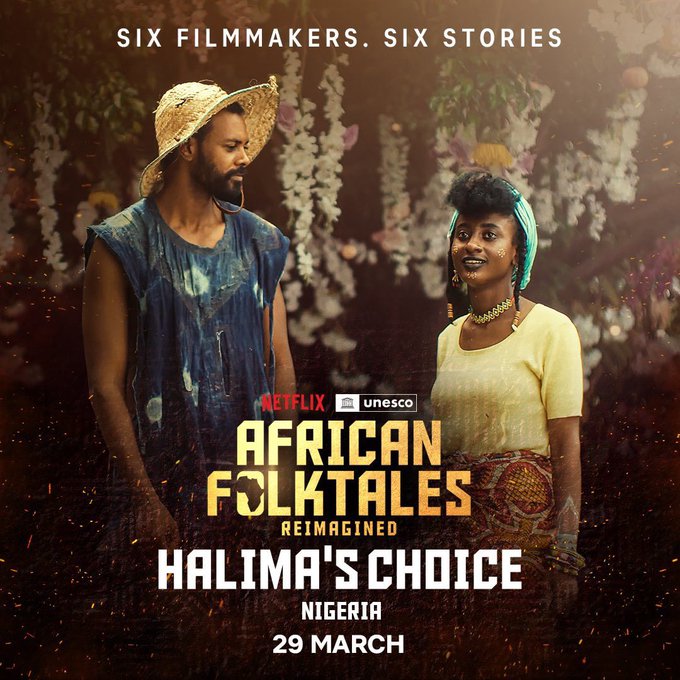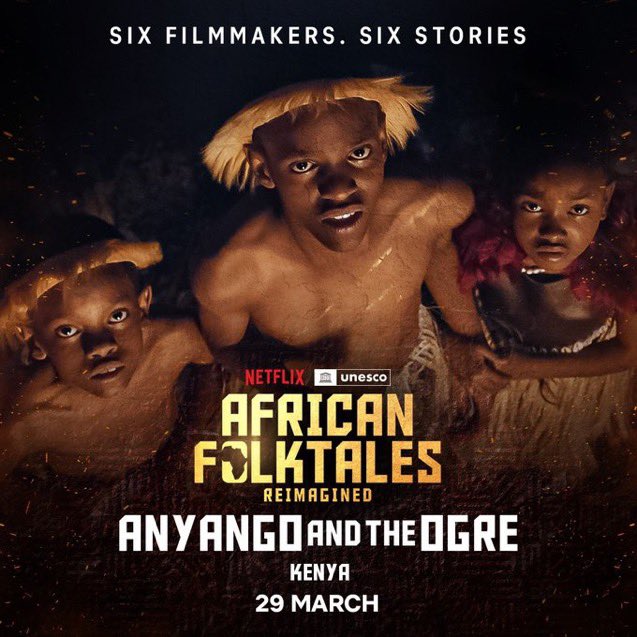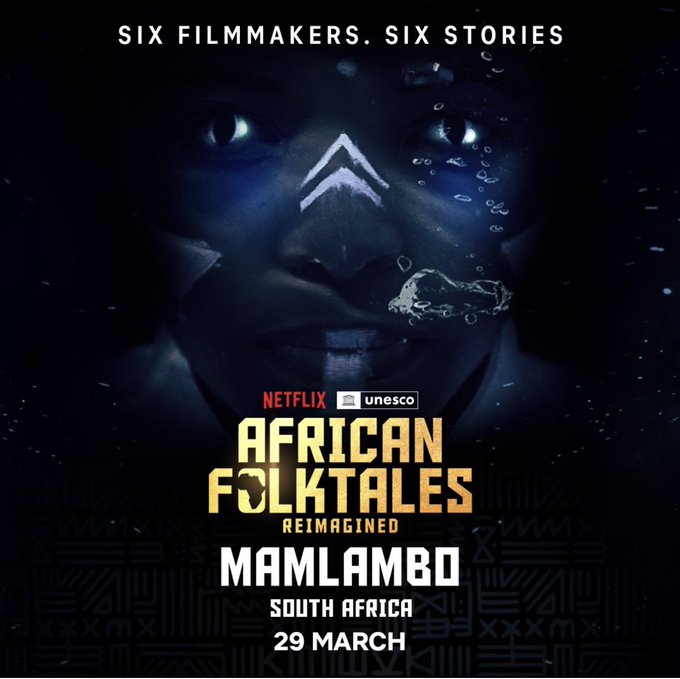African Folktales Reimagined was born after Netflix and UNESCO announced the six winners across the continent who had participated in a groundbreaking competition to find some of Sub-Saharan Africa’s up-and-coming filmmakers…
By Blessing Chinwendu Nwankwo
The first peculiarity in the African Folktales Reimagined shorts is seen in its respect for both human and nature. In this Netflix’s and UNESCO’s collaboration, we are taken through six folktales across Africa. Each episode is wrapped in great pictures, elaborate stories told in diverse languages, each with its own style and history. It’s a collection of re-imagined folktales with a contemporary twist.
https://www.youtube.com/watch?v=4lQ1xbhY32U
African Folktales Reimagined was born after Netflix and UNESCO announced the six winners across the continent who had participated in a groundbreaking competition to find some of Sub-Saharan Africa’s up-and-coming filmmakers. The winning short films were released on Netflix on March 29, 2023. The anthology includes works by Loukman Ali (Uganda), Korede Azeez (Nigeria), Voline Ogutu (Kenya), Mohamed Echkouna (Mauritania), Walter Mzengi (Tanzania), and Gcobisa Yako (South Africa).
Loukman Ali — Katera of the Punishment Land

Loukman Ali does not entirely fit my definition of “up and coming.” After his work on Girl in the Yellow Jumper, the Ugandan director rose to prominence. The last time we heard from him, he had just opted out from the production of Brotherhood, his first Nollywood film.
The skilled filmmaker/cinematographer’s work on Katera of the Punishment Land will have you stunned. The short film is based on true historical events, and is a re-imagined folktale. Young girls who became pregnant out of wedlock in early Uganda, and even a little later with the arrival of missionaries and colonists, are taken to the Island and left to starve to death. While the stated reason was that they bring shame to their family, it is worth noting that, at that time, the bride price was only paid for virgins. As a result, their banishment is not only a punishment for their shame, but also for the loss their family would make.
In 27 minutes, Ali gives amazing visuals with top quality cinematography and lighting, an intriguing soundtrack, and a beautiful plot that explores motherhood, strong will, love, and crime in his remake of this epic.
Rating: 3/5
(Read also: IKONAWARDS 2023: Ugandan Filmmakers, Loukman Ali, Doreen Mirembe, Top Winners List)
Korede Azeez — Halima’s Choice

During an interview with This Day, Nigerian filmmaker, Korede Azeez, explained how her vision was fuelled by determination and consistency. Azeez’s Halima’s Choice was created in Hausa because it was shot in the northern region. The film investigates the themes of artificial intelligence and willpower, while employing science and technology to create a story that challenges conventional thinking through futuristic storytelling.
“There has been a mass migration of 99% of Earth’s inhabitants into the virtual world of Napata, while the remaining 1% refused to be controlled by AI,” as narrated in the film.
Halima’s Choice is a science fiction and fantasy film that questions reality, and depicts a world in which everything happens exactly as the mind wishes. In its exploration of the arranged marriage system still in use in many parts of Africa today, the story is similar to the plot of Dry (2015). Halima, against her father’s wishes, chooses a different path in life. When faced with the choice of staying or fleeing, Halima opts for the latter. Sadly, the consequences of her decision are way more than she imagined.
The short film detracts down an unpredicted path. The inability of the audience to predict what will happen next is most likely the cherry on top of Halima’s Choice. While the story is not fully developed, it is relevant to society’s expectations of women and the retaliation by powerful women to not let society define or limit their dreams. The production’s costume, props, and location are all detailed in ways that transport you on a cinematic journey with the crew. It’s almost as if the film is brought to life in its rawest form.
Overall, Halima’s Choice tries to prove its worthiness for a spot on this series in the 24-minutes it runs. Unfortunately, I slightly disagree as its inclusion of sci-fi themes may have diluted its African originality.
Rating: 2.8/5
Voline Ogutu — Anyango and the Ogre

Kenyan actress, Sarah Hassan, plays the lead in Voline Ogutu’s Anyango and the Ogre. The story of Anyango and the Ogre is the reality for many women who are victims of domestic violence, which later results in traumatic childhoods for many children.
Ogutu’s story delves into abuse, motherhood, and societal pressure. The government divides a community into the Blue Zone (the home of marital bliss) and the Grey Zone, which houses single women without husbands. Houses in the Blue Zone are better looking than the huts the residents in the Grey Zone are made to live in.
The most intriguing part of the short film is how the stories play out, the delivery by the cast and the relatability to the present day society. The story is informative and carries moral lessons about contentment. As we observe, while some women are struggling to go into the Blue Zone, the reality of the residents in the Blue Zone are not as rosy as it seems.
Rating: 3.2/5
Mohamed Echkouna — Enmity Djinn

In Mohamed Echkouna’s Enmity Djinn, there is a thin line drawn between the real life and the metaphysical. Djinna, according to Arabic mythology, is a spirit inhabiting the earth but unseen by humans, and capable of assuming various forms and exercising extraordinary powers.
This short film is enlightening and a bit horrific in its storytelling. Little or no words are said in the making of this movie. While other events happen in the background, the film is centred on the Djinn (Mamadou Moktha N’diaye Gueye) and the Grandmother (Zainabou Ahmed Mohamed). The story is that of facing one’s fears and high spirituality. After a traumatic encounter with a Djinn as a baby, the grandmother finally has the chance to face her nightmare after 75 years.
Sadly, I had to watch this episode twice for better understanding. A novice or a person unaware of what and who the Djinn is will probably find the movie incomprehensible. However, besides its complexity, Enmity Djinn is informative and holds beauty in its visuals and style.
Rating: 2.5/5
Walter Mzengi — Katope

Katope is a Tanzanian folktale by Walter Mzengi. Katope seems to be a remake of the short story, “The Story of Katope: Boy Created from Dark” by Walter Bgoya and Abdallah Gugu. Only this time, it is a girl not a boy as proposed by the original story.
Katope is moulded by her mother with clay, and with her existence brings drought to the land. Ten years after her mother made her, Katope is seen lying in the desert where she is visited by a mysterious rain bird. In an attempt to keep Katope safe, her mother locks her up at home and heads for the ritual organised to appease the rain god. Just like her first visit, Katope is visited again by the mysterious bird whose mission is never really mentioned.
With good cinematography and good acting, the story expresses in just 13-minutes what drought really feels like. Katope may have had its flaws, but luckily does not get overwhelmed by them.
Rating: 3/5
(Read also: Storyteller and Gentleman: What Is the Measure of Mike Ejeagha’s Influence on Highlife Music In Nigeria?)
Gcobisa Yako — MaMlambo

In MaMlambo, destiny supersedes pain. Young Amanda takes a suicidal dive into the river of no return (Umlambo Uolahleko), but is saved by some sort of river guardian. After giving her a second chance to live, the lady (Mkhulu), although mysterious, manages to redirect Amanda’s life. Amanda’s traumatic past is based on her experience of gender based violence. And her decision to die is based on her inability to fight back. The attempts to make a good story is watered down by the little or no effort made to build a back story.
The visual effects are barely commendable until the last minutes. Motives are not discussed nor are decisions based on proper plan.
While I might make the excuse that there is not a lot to expect from a short film with a 21-minute running time, the truth is that we saw more detail and better clarity with Mzengi’s Katope which ran for only 13-minutes.
Rating: 2.5/5
Although some of the stories are intriguing and others complex, the complexity of the others does no damage to a good and well told folktale. A good folktale highlights moments of stern decision making, reinforce consequences, highlight shared values or moral lessons, take place in natural settings, and, most importantly, explain how something came to be. An explanation of how something came to be is what some, if not all, of the six folktales overlook. Back stories aid comprehension, but some of these folktales are told as if the characters fell from the sky.
While this is a global directorial debut for some of them, the art these filmmakers explore is rooted in history. Overall, African Folktales Reimagined is an entertaining anthology with excellent acting. And, with each story lasting less than 30 minutes, it’s a perfect binge-worthy collection from Africa’s “up and coming” storytellers.
Average Rating: 2.9/5
(Watch African Folktales Reimagined on Netflix)
Blessing Chinwendu Nwankwo, a film critic, beautician, and accountant, currently writes from Lagos State, Nigeria. Connect with her on Twitter at @Glowup_by_Bee and on Instagram at @blackgirl_bee.





Honestly I totally agree with your comments and ratings. The movies had good story lines but not all were properly developed. Enmity Djinn is definitely my least favourite for story development. I stopped watching for a few days and reluctantly decided to finish it today. Even at that I kept rewinding to understand it. A little back story on the Arabic historical significance of Djinns would have helped cos Netflix is a global platform where half of your viewers know nothing about your history hence a very huge opportunity to educate was misses. Still its visual effect helped to keep interest but I don’t know how many people that would watch a movie solely for visuals.
Still all the producers did their best. It’s also a big win for short story producers and I’m eager to see many more African folktales such as these in the future.